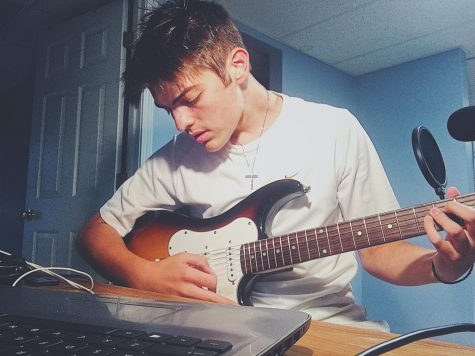Reckless endangerment: Why sports should not resume
For students who experienced problems with the advanced placement (AP) exams last year, Collegeboard’s decision to offer tests both online and in-person provides hope. “I took three AP tests last year and I enjoyed the less stressful environment and shorter test. However, I felt some people had an advantage based on their choice to cheat, and the shorter test did not allow for enough opportunity to express content mastery in the courses I took. I think tests being in person allows for equal opportunity for more students and makes a more standard testing experience,” Kennesaw Mountain Magnet junior Daniela Binns said.
As summer quickly leaves Georgia, the Coronavirus continues to plague our communities. After cases approached three hundred thousand, which led the Cobb County School District to mandate online learning to prevent the unnecessary spread of the virus. Paradoxically, the school district confirmed that sports would resume in accordance with Georgia High School Association guidelines, which includes limited spectator seating and wellness checks for athletes and others involved. Notably, spectators at football games may only occupy thirty percent of the stadium’s total capacity. This decision echoes that of professional sports associations, as fall sports resume despite concerns for public health.
“While I know sports is an important pillar of some students’ high school experience, the nature of the activity requires physical contact in a lot of cases. This wouldn’t be a bad thing, really, except that we are seeing rises in COVID cases in America—especially Georgia. To me, it’s irresponsible to have these kids risk their lives and their family’s lives just to have a fun season of games,” NC alumni Jacob Tutterow said.
Although following the recommended guidelines should reduce the possibility of spreading the virus between athletes, allowing athletes to practice and play in close quarters and spectators to watch still creates an unnecessary hazard. Wellness checks cannot determine whether or not an athlete carries the virus asymptomatically, and several sports necessitate close contact between athletes as part of the fundamental rules of the games. Contact sports, such as football, include players tackling each other, a facet of the extracurricular that fails to comply with the recommended six feet of social distance encouraged by the Central for Disease Control.
“I think sports shouldn’t resume because the pandemic is still going on and just because it’s been so long doesn’t mean that it’s safe. I think we should be doing everything we can to slow the numbers, considering Georgia is really up there on the list. I think it [is] reckless to let sports start again,” Junior Chloe McSpadden said.
Sports form an important pillar of our society, and by extension, a student’s high school experience. However, the lives of those who play and those who interact with athletes should take priority over a game or season, whether professional or amateur. Those offering scholarships to high school athletes could adapt to accommodate for their safety and the circumstances, and colleges could make adjustments for their athletes, much as Georgia colleges did when they waived standardized testing on applications.
The possibility of transmission without knowledge of ever carrying the disease remains a primary danger of the virus, as it allows the young and healthy to unintentionally spread it to those in danger, especially the elderly or immunocompromised. The school board should avoid inadvertently putting those at high risk in exposure to dozens of athletes who may unknowingly carry COVID-19, and align their stance on sports with their stance on education itself.


